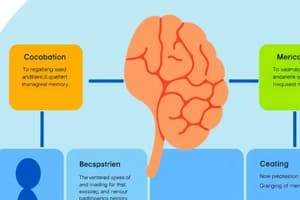Podcast
Questions and Answers
What is the first process of memory described in the basic processes of memory?
What is the first process of memory described in the basic processes of memory?
- Storage
- Encoding (correct)
- Decoding
- Retrieval
Which type of memory lasts only for an instant and is recorded as a raw, non-meaningful stimulus?
Which type of memory lasts only for an instant and is recorded as a raw, non-meaningful stimulus?
- Working Memory
- Sensory Memory (correct)
- Short-term Memory
- Long-term Memory
Which component of sensory memory refers to information processed visually?
Which component of sensory memory refers to information processed visually?
- Iconic Memory (correct)
- Echoic Memory
- Working Memory
- Short-term Memory
What does the transfer of information from sensory memory to short-term memory depend on?
What does the transfer of information from sensory memory to short-term memory depend on?
What is the duration for which echoic memory lasts?
What is the duration for which echoic memory lasts?
Which of the following processes refers to the retrieval of stored information?
Which of the following processes refers to the retrieval of stored information?
In the process of memory, what does storage refer to?
In the process of memory, what does storage refer to?
Which type of memory is defined by Atkinson and Shiffrin as having a duration from only a fraction of a second to a few seconds?
Which type of memory is defined by Atkinson and Shiffrin as having a duration from only a fraction of a second to a few seconds?
What type of memory is responsible for storing factual information such as names and dates?
What type of memory is responsible for storing factual information such as names and dates?
Which memory type includes our knowledge of general facts and the rules of logic?
Which memory type includes our knowledge of general facts and the rules of logic?
What kind of memory is able to provide recall of personal experiences like our first date?
What kind of memory is able to provide recall of personal experiences like our first date?
What is the primary function of procedural memory?
What is the primary function of procedural memory?
What role do retrieval cues play in memory?
What role do retrieval cues play in memory?
Which statement describes context-dependent memory?
Which statement describes context-dependent memory?
What is state-dependent memory primarily concerned with?
What is state-dependent memory primarily concerned with?
Which term describes the process of retrieving memories with minimal external cues?
Which term describes the process of retrieving memories with minimal external cues?
What is the maximum duration for which short-term memory can hold information?
What is the maximum duration for which short-term memory can hold information?
Which component of working memory is responsible for holding and maintaining material related to speech?
Which component of working memory is responsible for holding and maintaining material related to speech?
Long-term memory is characterized by which of the following features?
Long-term memory is characterized by which of the following features?
What is the primary function of the Central Executive in working memory?
What is the primary function of the Central Executive in working memory?
Where in the brain is short-term memory primarily stored?
Where in the brain is short-term memory primarily stored?
Which of the following statements about masking is accurate?
Which of the following statements about masking is accurate?
What physiological changes occur in the brain when information is stored in long-term memory?
What physiological changes occur in the brain when information is stored in long-term memory?
What is the storage capacity of short-term memory?
What is the storage capacity of short-term memory?
What does the acronym SQ3R stand for in the context of study techniques?
What does the acronym SQ3R stand for in the context of study techniques?
Which term best describes memories of specific events that seem extraordinarily detailed and emotionally significant?
Which term best describes memories of specific events that seem extraordinarily detailed and emotionally significant?
Which factor is NOT a cause of forgetting according to the content provided?
Which factor is NOT a cause of forgetting according to the content provided?
How does the decay theory explain the phenomenon of forgetting?
How does the decay theory explain the phenomenon of forgetting?
What is one possible reason for a failure of encoding leading to forgetting?
What is one possible reason for a failure of encoding leading to forgetting?
What is the primary characteristic of anterograde amnesia as it relates to forgetting?
What is the primary characteristic of anterograde amnesia as it relates to forgetting?
Which aspect of memory does NOT seem to relate directly to the decay theory?
Which aspect of memory does NOT seem to relate directly to the decay theory?
What method should be used in the 'Read' step of SQ3R to improve understanding?
What method should be used in the 'Read' step of SQ3R to improve understanding?
What is Korsakoff's syndrome primarily associated with?
What is Korsakoff's syndrome primarily associated with?
What symptoms are commonly exhibited by individuals with Korsakoff's syndrome?
What symptoms are commonly exhibited by individuals with Korsakoff's syndrome?
Which technique is NOT mentioned as a method for retrieving repressed memories?
Which technique is NOT mentioned as a method for retrieving repressed memories?
Motivated forgetting suggests individuals find it easier to remember which type of memories?
Motivated forgetting suggests individuals find it easier to remember which type of memories?
Why is studying motivated forgetting in a laboratory setting considered difficult?
Why is studying motivated forgetting in a laboratory setting considered difficult?
Flashcards are hidden until you start studying
Study Notes
Memory Definition
- Memory is the process of encoding, storing, and retrieving information.
Basic Processes of Memory
- Encoding: The process of initially recording information in a usable format for memory.
- Storage: The process of maintaining information in the memory system.
- Retrieval: The process of recovering stored information.
Types of Memory
- Sensory Memory:
- Brief, initial storage of information gathered by our senses.
- Lasts only for an instant.
- Raw, non-meaningful stimulus, not yet processed by the brain.
- Iconic Memory:
- Visual sensory memory.
- Lasts for approximately 1 second and is processed by the visual cortex.
- Echoic Memory:
- Auditory sensory memory.
- The auditory cortex takes about 3-4 seconds to process sound vibrations, allowing for high precision despite the brief duration.
- Stored in the temporal and occipital lobes.
- Masking Effect:
- New sensory information replaces old information in the sensory register.
- Caused by constant sensory input, lack of attention, and the short duration of storage.
- Short-Term Memory (STM):
- Holds information for 15-25 seconds.
- Limited storage capacity (about 7±2 items).
- Stores information in terms of its meaning.
- Located in the hippocampus.
- Working Memory:
- Interprets information held in STM.
- Central executive coordinates cognitive processes (thinking, decision-making, reasoning).
- Two sub-components:
- Visuospatial sketchpad (visual and spatial information).
- Phonological loop (speech, words, and numbers).
- Long-Term Memory (LTM):
- Relatively permanent storage of information.
- Information is transferred from STM to LTM through a physiological mechanism that is not fully understood.
- Stores information in the form of mental categories.
- Unlimited storage capacity.
- Items are stored as engrams - physiological changes in the brain that occur when information is stored.
- Located in the cerebral cortex.
Types of Long-Term Memory
- Declarative Memory:
- Memory for factual information (names, faces, dates, etc.).
- Further divided into:
- Semantic Memory: Stores general knowledge and facts about the world, including logic rules for deducing facts.
- Episodic / Autobiographical Memory: Stores information related to personal life experiences (first date, falling off a bicycle, etc.).
- Procedural Memory: Memory for skills and habits (riding a bicycle, playing a musical instrument, etc.).
Retrieving Long-Term Memory
- Retrieval Cues: Stimuli that help us recall information from LTM more easily.
- Context-Dependent Memory: Memory that is influenced by the context in which the information was initially learned.
- State-Dependent Memory: Memory that is influenced by the physiological and psychological state of the individual.
Techniques to Improve Memory
- Mnemonics: Formal techniques for organizing material using the first alphabet (e.g., VIBGYOR, NIMHANS, STM, LTM).
- Chunking: Grouping information into smaller, meaningful units.
- SQ3R: A study technique that involves:
- Survey: Skimming the material (headings, titles, charts, graphs).
- Question: Convert headings into questions (why, what, when, how, where).
- Read: Search for answers to the questions.
- Recite: Summarize answers in one's own words.
- Review: Test oneself or rehearse the material.
Flashbulb Memory
- A vivid, clear memory of a specific event that was personally significant or surprising.
- Often emotionally arousing.
- Not always completely accurate, but the remembered details seem extraordinary.
Forgetting
- The apparent loss of information that was previously encoded and stored in LTM.
Causes of Forgetting
- Failure of Encoding:
- Lack of attention during learning, resulting in information not being encoded into LTM.
- Examples:
- Anterograde amnesia (inability to form new memories).
- Masking (new information overwrites old information).
- Decay Theory:
- Loss of information due to non-use.
- Assumes that a memory trace fades away with time.
- Not always accurate; memories can be recalled even if they haven't been used often.
- Korsakoff's Syndrome:
- Amnesia associated with long-term alcoholism and thiamine deficiency.
- Symptoms include hallucinations, repetitive questioning, and confabulation (making up memories).
- Motivated Forgetting (Repression):
- Difficulty retrieving anxiety-provoking or threatening information from LTM.
- May explain why individuals often remember positive events better than negative ones.
- Retrieval can sometimes occur through techniques like free association, hypnosis, or truth serums.
Studying That Suits You
Use AI to generate personalized quizzes and flashcards to suit your learning preferences.




